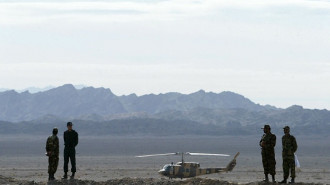US-led coalition will not target IS militants in government controlled areas in Syria
The comments were made by Felix Gedney, the British Army Major General, and indicate that the coalition will be dependent on the Syrian government going after the militants in the areas controlled by forces loyal to the president.
In the past, US officials have said that Syrian government forces are too few, too poor and too weak to fight the Islamic State.
Gedney, the deputy commander of strategy and support for the coalition, said the fight against IS was not over, and militants had been seen moving west of the Euphrates river.
"They seem to be moving with impunity through regime-held territory, showing that the regime is clearly either unwilling or unable to defeat Daesh within their borders," Gedney said, using the Arabic acronym for the extremist group.
On the western side of the Euphrates are the Syrian government forces and their allies, backed by Russian air power. The eastern bank has the coalition forces.
Gedney added that there were no plans to target the militant in areas controlled by the Syrian regime.
"We will continue to deconflict with the Russians, but we have got no intention to operate in areas that are currently held by the regime."
A communication channel was set up by Russia and the United States in order to reduce the chance of fighting between the two rival sides against the Islamic State.
"We would call on the Syrian regime to clear ISIS from those areas that are currently under their control," Gedney added.
There are less than 1,000 IS fighters estimated remaining in Iraq and Syria.
Jim Mattis, the US defence secretary, said the US military will fight Islamic State in Syria "as long as they want to fight." He added the longer-term objective would be to prevent the return of an "ISIS 2.0."

![Palestinians mourned the victims of an Israeli strike on Deir al-Balah [Getty]](/sites/default/files/styles/image_684x385/public/2024-11/GettyImages-2182362043.jpg?h=199d8c1f&itok=xSHZFbmc)


![The law could be enforced against teachers without prior notice [Getty]](/sites/default/files/styles/image_684x385/public/2178740715.jpeg?h=a5f2f23a&itok=hnqrCS4x)
 Follow the Middle East's top stories in English at The New Arab on Google News
Follow the Middle East's top stories in English at The New Arab on Google News
![Fakhrizadeh [AFP] Fakhrizadeh [AFP]](/sites/default/files/styles/image_330x185/public/media/images/774C39F7-8F7A-4D67-B998-27D102FCB4A7.png?h=d1cb525d&itok=j9eGvunV)

